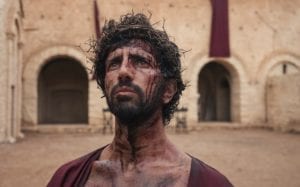Ahhhh! The Lenten season is upon us — filled with opportunities to introduce the unbeliever to Christ and renew our own faith through a myriad of media programming on the life, death and resurrection of Our Lord and Savior. There is something powerful in sharing the Gospel (aka ‘The Greatest Story Ever Told’) visually, depicting Jesus’ teachings, sacrifice and triumph for us 21st century spectators.
But what if we could see Jesus Christ through the eyes of those who knew Him the most? Who loved Him? Who despised Him?
Premiering Monday, March 25th at 8pm ET/PT the History Channel will present “Jesus: His Life” in an eight-part series over four weeks. Each night will feature two back-to-back episodes, each from the standpoint of an integral character in Christ’s life: Joseph, Mary mother of Jesus, John the Baptist, Caiaphas, Peter, Pontius Pilate, Mary Magdalene and Judas Iscariot. Each takes us on a journey, discovering Jesus Christ through their eyes during the most revolutionary time in history. We get a bird’s eye view into the power struggles, the personal sacrifices, the reformations — all impacted by one man’s presence. Along with the dramatization of biblical times, interviews with experts from diverse fields will complete the landscape of this incredible man in history — Jesus Christ: the man and the Messiah.
Tackling this feat are the world’s top scholars, theologians, archaeologists, historians and church leaders. The Good News is proud to present to you an interview with one of the contributing experts, Dr. Robert Cargill, who is an Assistant Professor of Judaism, Christianity, and Classics at the University of Iowa, editor of Biblical Archaeology Review, author of “Cities That Built the Bible” and more, and has appeared as an expert and consultant on various tv/cable programming.
 GN: Robert, can you tell us why you committed to this project?
GN: Robert, can you tell us why you committed to this project?
RC: It intrigued me. In this series we are able to see a very human side of Jesus and see His responses. In past documentaries, we’re shown upfront who Jesus is, with Him being the central character. In “Jesus: His Life” we see Jesus peripherally through the other characters — through their own fears and doubts. Makes it very compelling.
GN: There is quite a diverse group of experts, as well as leaders from various denominations who have worked on this project: from Protestant to Catholic to Agnostic. This makes for a rich, in-depth approach, but were there any challenges with this? Any differences in interpretation?
RC: Actually, no. The producers sought out diversity to bring different viewpoints, which is equal to what happened back in biblical times. Times are just as diverse back then as they are now. By bringing in archaeologists, historians and theologians, we are able to bring together these different aspects to better depict the climate of the day.
GN: What impact do you feel this drama-doc will have on both the believer and nonbeliever?
RC: In approaching Jesus in this way, people of faith will discover Him differently than before. For the nonbeliever they will see Him as compelling. Both will be able to relate to a character in the story who encounters Christ. There’s something for everyone.
GN: Robert, can you give our readers a glimpse of this?
RC: Sure. Take for example Joseph. Besides standing up for his fiancée, Mary, who is carrying a child not his own, he is now raising this child along with his own children. This may resonate with those who today are step-parents, adoptive and foster parents. There are challenges that are unique. In the political arena we see how Pilate and Caiaphas had to work together to promote each other’s well-being. They needed each other to create a balancing act. We see just how pivotal Christ’s presence was at that time.
GN: On a personal note, what do you like about this series?
RC: I like that it’s not overly theological: it’s not like going to church. Jesus Christ means something for those in the 1st century as well as today. It creates personal reflection between the viewer and Jesus and is told in historical fashion. I was impressed with as many scholars and experts that were sought after and who contributed to this innovative approach, that the project remained true to the text of the Bible and did not take liberty in speculation just to create something new. The script stayed true to the Scriptural text to the greatest extent possible, which was the goal of all involved.
If you’re wanting to enrich your Lenten/Easter season or wanting a new approach in spreading the gospel, consider hosting a viewing of this series in your home, church or community.
Christine Alexander is a freelance writer and an aspiring humble servant of Our Lord Jesus Christ. Contact her at [email protected]

Comments